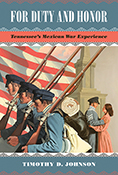For Duty and Honor
Tennessee's Mexican War Experience

The outbreak of the American Civil War was destined to cast a long shadow over the earlier, shorter Mexican-American War (1846—1848), as evidenced by today’s relatively slight historiography on the conflict. As for Tennessee’s role in the war, history remembers little more than its large contribution of volunteers and subsequent state moniker as “The Volunteer State.” Today, beliefs persist that the Mexican-American War was simply a colossal land grab for the United States in its pursuit of the doctrine of Manifest Destiny, and that Tennesseans enlisted to protect and expand the institution of slavery. As Timothy D. Johnson notes in For Duty and Honor, these stereotypes do not characterize the motives of Tennesseans. Through a succinct examination of journals, memoirs, and letters from the conflict, Johnson reveals that Tennesseans volunteered out of a sense of duty and honor—principles that were deeply embedded in the early national period. They also enlisted because of family and community expectations as well as a desire to demonstrate manhood and courage. In the process, Johnson provides much-needed historical and political context for the Mexican-American War. For Duty and Honor treats not only Tennessee’s unique role in the conflict, but also the postwar efforts by veterans to shape the war’s legacy. Using clear, accessible language and groundbreaking research, Johnson resurrects an all-but-forgotten moment in Tennessee’s rich history.
Timothy D. Johnson is professor of history and University Research Professor at Lipscomb University in Nashville, Tennessee. He received his PhD from the University of Alabama in 1989 and has published extensively on military history in the antebellum period. He is the author or editor of numerous articles, and six previous books including three on the Mexican-American War. His Notes of the Mexican War, 1846-1848, along with Memoirs of Lieut. General Winfield Scott, both were published by the University of Tennessee Press. In addition, he has been a research fellow at Yale University and the Virginia Historical Society.
